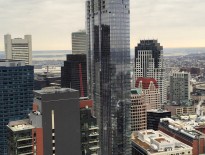The fate of Millennium Partners’ billion-dollar redevelopment of Boston’s Winthrop Square garage site heads to the city council this week as regulators seek a one-time exception to laws limiting shadows cast by new buildings on Boston Common and the Public Garden.
Boston Planning and Development Agency (BPDA) Executive Director Brian Golden said a “significant majority” of councilors support the measure, which was scheduled to be filed Monday by District 2 Councilor Bill Linehan.
Golden said the bill is designed to provide a one-time exception for Millennium’s proposed 775-foot-tall tower because the sale of the 1-acre BPDA-owned property would yield up to $150.8 million for the city.
“This is a once-in-a-century opportunity to get that investment that otherwise would be impossible,” Golden said at a press briefing Friday.
But a state legislator says he remains skeptical of the bill’s chances of passage on Beacon Hill, which would be the next step after council approval.
“I don’t know any state legislator who supports the bill in its current form,” state Rep. Jay Livingston, D-Boston, told Banker & Tradesman via email.
The Home Rule petition would exempt the Millennium project at 115 Federal St. from the shadow laws. Any building taller than 365 feet on the site is prohibited under the current laws, Millennium Partners estimates.
At the same time, the legislation places new restrictions on development in the Midtown Cultural District, which includes portions of Downtown Crossing and Chinatown. It eliminates the remaining 10,000 square feet in a “shadow bank” that other developers can tap into for future projects that exceed the limits on new shadow on the parks.
“Our argument is you get a better outcome by accepting the Winthrop Square shadow and eliminating the possibility of the shadow bank allowing new height in the Midtown Cultural District,” Golden said.
The legislation would take the existing shadow limits in the city’s 1-year-old Stuart Street zoning code and add them to state law, eliminating developers’ option of appealing for variances. It also calls for a BPDA planning study of the Midtown Cultural District, Financial District and potentially other downtown neighborhoods to assess issues including shadow impacts, open space requirements and displacement.
Millennium proposes luxury condominiums above commercial space and a 12,000-square-foot public “Great Hall” connecting Federal and Devonshire streets. It submitted an up-front offer of $100 million plus up to $50.8 million contingent upon the sale of the 507,960 square feet of condos with a contribution to the city of $100 per square foot.
Mayor Martin Walsh has stated his support for using proceeds from the Winthrop Square sale for improvements to Boston Common and Franklin Park and public housing in South Boston and East Boston.
Resolving the shadow issue quickly is a priority for the BPDA as it seeks to redevelop the garage property while the real estate market remains strong.
The agency is expected to release a scoping document shortly that would enable Millennium Partners to move forward with its permitting under the Article 80 large project review process.
The Friends of the Public Garden and the Neighborhood Assoc. of the Back Bay have opposed attempts to change the shadow laws, enacted in the early 1990s in response to encroaching development.
While characterizing the elimination of the shadow bank as a “good start,” Livingstone said he remains “greatly concerned” about the effects on the Common and Public Garden.
“These parks are enjoyed by millions of visitors every day from every part of the city and from around the world. The parks are also economic drivers for tourism in the city,” he wrote.




 |
| 

